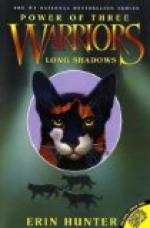“You are wiser than most people,” Dill observed dryly.
“Oh, sure. Say, if I don’t see Flora—I’m going to hike back to camp pretty quick—you tell her I’m going to try and pull in close enough to take in that dance at Hardup, the Fourth. I heard there was going to be one. We can’t get through by then, and I may not show up at the ranch, but I’ll sure be at the dance. I—I’m in a hurry, and I’ve got to go right now.” Which he did, and his going savored strongly of flight.
Dill, looking after him queerly, turned and saw Mama Joy standing in the doorway. With eyes that betrayed her secret she, too, was looking after Billy.
“There is something more I wanted to say to William,” explained Dill quite unnecessarily, and went striding down the path after him. When he reached the stable, however, he did not have anything in particular to say—or if he had, he refrained from disturbing Billy, who was stretched out upon a pile of hay in one of the stalls.
“My hoss ain’t through eating, yet,” said Billy, lifting his head like a turtle. “I’m going, pretty soon. I sure do love a pile uh fresh hay.”
Their eyes met understandingly, and Dill shook his head.
“Too bad—too bad!” he said gravely.
CHAPTER XVI.
Self-defense.
The wagons of the Double-Crank had stopped to tarry over the Fourth at Fighting Wolf Spring, which bubbles from under a great rock in a narrow “draw” that runs itself out to a cherry-masked point halfway up the side of Fighting Wolf Butte. Billy, with wisdom born of much experience in the ways of a round-up crew when the Fourth of July draws near, started his riders at day-dawn to rake all Fighting Wolf on its southern side. “Better catch up your ridge-runners,” he had cautioned, “because I’ll set yuh plumb afoot if yuh don’t.” The boys, knowing well his meaning and that the circle that day would be a big one over rough country, saddled their best horses and settled themselves to a hard day’s work.
Till near noon they rode, and branded after dinner to the tune of much scurrying and bawling and a great deal of dust and rank smoke, urged by the ever-present fear that they would not finish in time. But their leader was fully as anxious as they and had timed the work so that by four o’clock the herd was turned loose, the fires drenched with water and the branding irons put away.
At sundown the long slope from Fighting Wolf Spring was dotted for a space with men, fresh-shaven, clean-shirted and otherwise rehabilitated, galloping eagerly toward Hardup fifteen miles away. That they had been practically in the saddle since dawn was a trifle not to be considered; they would dance until another dawn to make up for it.
Hardup, decked meagrely in the colors that spell patriotism, was unwontedly alive and full of Fourth of July noises. But even with the distraction of a holiday and a dance just about to start and the surrounding country emptied of humans into the town, the clatter of the Double-Crank outfit—fifteen wiry young fellows hungry for play—brought men to the doors and into the streets.




